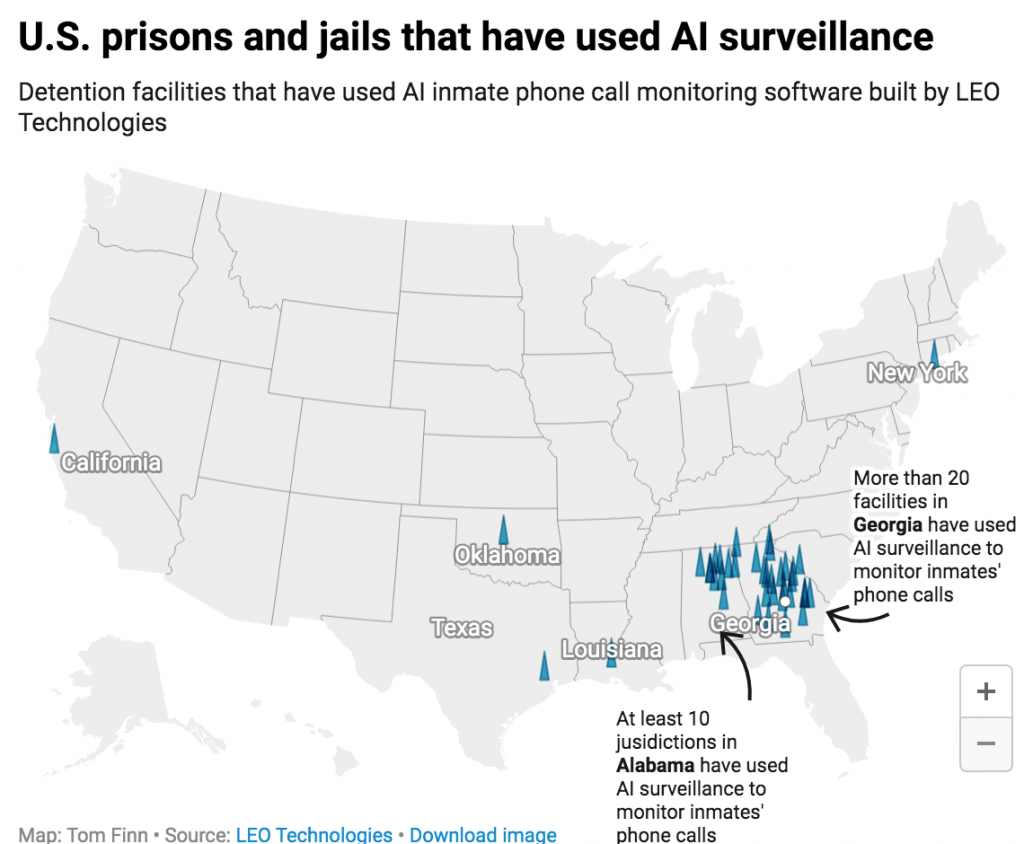
Prison Companies Cross the Line Between Surveillance and Invasion of Privacy
When AI is used by law enforcement you might think of video surveillance. But a story from news.trust.org has a startling revelation regarding using AI on prison phones.
A prison in Suffolk County, Georgia has been using AI to screen prison phone calls for certain trigger words. The AI has been reviewing around 600,000 hours a month of these calls. Can this be an invasion of a prisoner’s privacy? No, according to authorities.
Beginning in 2019, Suffolk County was an early pilot site for the Versus-AI-scanning system sold by California-based LEO Technologies, which uses Amazon speech-to-text technology to transcribe phone calls flagged by keyword searches.
There are several selling points used for this particular AI. Leo Technologies says Versus AI can help with:
- Medical Surveillance and Monitoring: Phone calls recorded and flagged by Versus AI help personnel identify sick inmates.
- Enhanced Facility Security: As manpower is down, Versus AI helps jails and prisons identify problems proactively and assign staff where the need is most critical.
- Enhanced Safety for Inmates and Staff: In addition to medical monitoring, intelligence from Versus AI mitigates potential violence—including potential COVID-19 related murders.
- Community Support: Intelligence from Versus AI supports patrols and investigations as community fears and anxieties escalate.
The company and law enforcement officials say it is a crucial tool to keep prisons and jails safe, and fight crime, but critics say such systems trample the privacy rights of prisoners and other people, like family members, on the outside.
This has raised a lot of red flags for several groups.
“The ability to surveil and listen at scale in this rapid way—it is incredibly scary and chilling,” said Julie Mao, deputy director at Just Futures Law, an immigration legal group.
The $700,000 system is also being used in Texas, Alabama, California, and other states institutions. And it appears it is really delivering on its intended purposes, but at a cost to the few liberties that prisoners have.
A series of court rulings have given U.S. authorities wide scope to use surveillance of prisoners’ conversations as long as they are working to ensure safety and fight crime.
“All county inmates are notified that their phone calls are monitored,” Catalina said.
The Results Are Chilling and Succesful
The Versus AI is better than any of its competitors by a long shot. The idea is that using AI can review so many phone call conversations, and that will allow the staff to do other jobs at the prison. It even picks up slang words gang members use to hide certain issues.
Public records show Versus AI is routinely deployed, for example, to identify inmates who might be contemplating self-harm or suicide, or find murderers and rapists inside and outside of correctional facilities.
It even listens for Covid-19 trigger words. Words like “cough” or “fever” will alert the system.
In Suffolk County alone, Versus AI was used for monitoring more than 2.5 million phone calls between its implementation in April 2019 and May 2020—leading to 96 “actionable intelligence reports,” according to county documents. That seems like a lot of effort and monitoring of a prisoner’s family members or friends. Of course, their names have been reviewed by the authorities as well.
The fear is that the system works so well, how long before it is unleashed on the general public for a host of reasons that authorities can use to surveil us. Perhaps it already is. AI use could produce an avalanche effect, say members of civil liberties groups.
“You can see how the justification changes over time,” said Daniel Schwarz, a lawyer with the American Civil Liberties Union in New York who reviewed some of the documents…We need to think about what happens to people when the only communication they have with their families and loved ones comes with a big surveillance target on their backs,” he said.
read more at news.trust.org







Leave A Comment